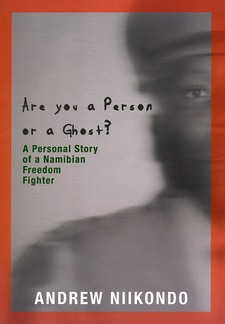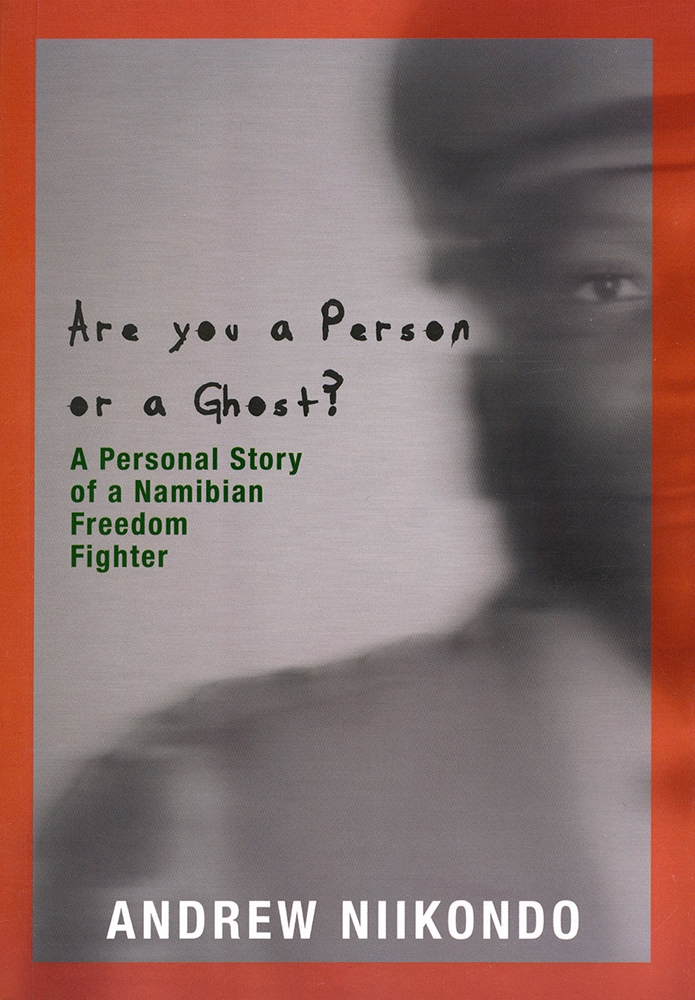Are you a person or a ghost? A Personal Story about a Namibian Freedom Fighter, by Andrew Niikondo

Are you a person or a ghost? A Personal Story about a Namibian Freedom Fighter, by Andrew Niikondo. Kuiseb Publishers. Windhoek, Namibia 2018. ISBN 9789994576593 / ISBN 978-99945-76-59-3
From Year One to Boyhood - Early Childhood: an excerpt from Are you a person or a ghost? A Personal Story about a Namibian Freedom Fighter, by Andrew Niikondo.
I was born into a hybrid family that combined peasant farming and migrant work. My birthday, as it appears in the church records, was on 15 January 1962; I was the second child in a family of nine - seven boys and two girls and we are: Johannes Mbonge Niikondo (1959), Andreas Simaneka Niikondo (1962), Stephanus Pendukeni Niikondo (1964), Paulus Tuutaleni Mbendeka Niikondo (1966), Elina Ndinelago Niikondo (1969), Reinhold Kashegele Niikondo (1971), Samuel Sara Panduleni Niikondo (1973), Jason Nalilongwe Niikondo (1975) and the last born, Emilia Ndagwedha Niikondo (1979). Only one of us has passed on - the son who was born in 1966. Our mother Julia Ananias Muatala and my father Thomas Jesaja Niikondo are presented in Illustration. The available records show that my birth coincided with the absence of my father on a contract at Oranjemund (a small diamond mining town on the banks of the Orange River), where he was employed by CDM. This contract took him away from home for twelve months. Thus, I was born whilst my mother was the sole head of the family, homestead and livestock. Her cousin Elina Shapopi assisted her in her daily chores. The maternity ward where I was born was a traditional hut in a traditional homestead. At that time, the nearest medical centre was Onandjokwe Lutheran Hospital, but it was popular for babies to be delivered at home by a traditional midwife. My first name 'Usiku' indicates that I was born in the evening or at night, and the person who gave me this name was the traditional midwife. It is the normal practice within the Oshiwambo tradition that the midwife names the baby, a few moments after its birth. If the baby is born in the morning and it is a boy, then it is called Angula; if it is a girl, it is called 'Nangula' (meaning 'a person of the morning'). If the baby boy is born during the evening or at night, he is called 'Usiku' or 'Uusiku' (meaning a person of the evening'), hence my name was Usiku. This 'birth name' is temporary, pending the selection of a permanent name by the father: This is the Christian name, which is usually made public at baptism. I was thus baptised Andreas Simaneka. My namesake Uncle Andreas Iita preferred me to be called Nandjembo (Gunner) and he described me as 'Nandjembo yemu kutha puutyakala tayi mu fala paantu', meaning 'The Gun that changed him from the status of the poor to the elite'. At weaning my parents took me to my mother's aunt. She was called Johanna Joel and was married to a certain man called Lumbu yaShigewedha, who was living in Amweepele village, in the current Okatyali Constituency in the Oshana region. Amweepele village is around twenty kilometres from my birth village Onantsi, which in turn is around three kilometres southwest of the town of Ondangwa. I lived with my great-aunt and uncle in Amweepele between 1963 and 1969, when I was a toddler, from one to seven years old. Our homestead was the traditional Oshiwambo structure with thatched huts and stockades surrounding it. There were approximately fifteen huts in our homestead and no modern structures, such as buildings or metal houses with corrugated iron roofs. [...]
This is an excerpt from Are you a person or a ghost? A Personal Story about a Namibian Freedom Fighter, by Andrew Niikondo.
Title: Are you a person or a ghost?
Subtitle: A Personal Story about a Namibian Freedom Fighter
Author: Andrew Niikondo
Genre: Namibian Memoires
Publisher: Kuiseb Publishers
Windhoek, Namibia 2018
ISBN 9789994576593 / ISBN 978-99945-76-59-3
Softcover, 15 x 21 cm, 240 pages
Niikondo, Andrew im Namibiana-Buchangebot
Are you a person or a ghost? A Personal Story about a Namibian Freedom Fighter
Memoires from Namibia's Liberation. Struggle and independence: Are you a person or a ghost? A Personal Story about a Namibian Freedom Fighter.

